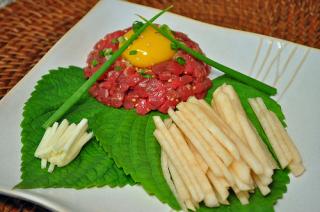In May, 2011, five people were killed – including two children — and over 180 sickened with E. coli O111 after eating raw beef dishes at restaurants in Japan.
After initially blaming the Australian supplier, Yasuhiro Kanzaka, president of Foods Forus Co., which runs the Yakiniku-zakaya Ebisu chain, said the company had not conducted microbial tests at any of its outlets since July 2009, adding, "We’d never had a positive result [from a bacteria test], not once. So we assumed our meat would always be bacteria-free.”
The Japanese health ministry subsequently stated it planed to begin imposing new penalties for  food safety violations as early as October, as current guidelines were nonbinding.
food safety violations as early as October, as current guidelines were nonbinding.
The agriculture ministry urged restaurants to ensure the trimming of all raw meat and to remind customers of the higher risks of food poisoning for children and the elderly.
It’s now December, and according to a report released last week, 59 of the 4,490 restaurants and meat suppliers inspected were providing raw beef cuts, including "yukke," to customers, despite new regulations requiring beef to be heated for at least two minutes in 60-degree water. Restaurants were also required to set up special sanitized workspaces to prevent bacterial infections.
The Tokyo metropolitan government report also revealed that none of the 59 locations serving the shredded raw meat met the new food safety standards issued in October.
"We have ordered the facilities that do not meet the standards to stop providing the dishes, and all of them have discontinued providing raw meat at this point," the metropolitan government said.
While the crackdown in Tokyo has ostensibly stopped yakiniku restaurants from serving yukke, some claim the strict regulation has only led restaurants to serve the dish under the table.
Although violations of the new safety rule can result in a fine of 2 million Yen or imprisonment of up to two years, the metropolitan government has only ordered the restaurants to stop providing raw meat.
Which is as effective as me telling my 3-year-old, “no” or “don’t do that.”
